
Recently on Cyclingnews.com |
An interview with Dr Allen Lim, July 12, 2006
Working with the young guns
Dr Allen Lim is part of the brains trust that has helped elevate Floyd Landis from Lance Armstrong domestique to outright Tour contender. Aside from his work with Landis, Lim has a full time position with the up-and-coming TIAA-CREF team. Cyclingnews' Shane Stokes continues his interview with Lim, asking him about his work with the squad, his assessment of the riders and about the philosophy of the ProTour-aspiring squad.
Part 1 of the Allen Lim interview is here.
CN: What is your role with the TIAA-CREF team?
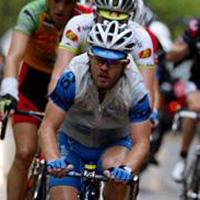
|
AL: What I found last year working with Floyd is that an athlete at his level is largely self-sufficient, is largely a self-coached individual. At the end of the day, Floyd takes counsel from a number of different individuals. He is always seeing advice. He is always looking for knowledge and is, by definition, a real student of the sport.
In that sense, for me I would have learned a lot more about cycling at that level than I probably taught him. It occurred to me that there is such a big chasm between someone on Floyd's level and some of these developing riders. I realised that my knowledge, my experience and my education might serve well in helping those developing riders, and in addition I always had a real passion for cycling at a junior and espoir level. I have also had a really strong feeling towards helping to develop more American riders. If you look at Discovery, although it is an American-based cycling team, there are not that many Americans there on the squad. That is a big shame, I think.
Johnathan [Vaughters] was talking to me about helping to coach the riders on TIAA-CREF. I had always told him that if the budget was there, I would be really interested in having a position on the team. He found the money last year and brought me on full-time as the team physiologist, so my permanent role is to work with the riders. I coach six to eight of the riders right now, while Jonathan and Ben Turner coach the rest of the riders. We share the coaching load and then I do a bit of the directing.
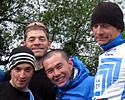
|
CN: What else do you do?
AL: What I do a lot of, mostly, is thinking of about new type of training strategies, technologies and things we can do differently to help optimise their performance. The riders are so young and so open-minded that they are willing to try different things, to experiment and see if that helps improve their performance. We have been able to innovate in a number of ways, from using power meters and GPS units in their training to looking at different types of nutrition.
On a bigger pro team it is very, very hard to implement those new technologies and new thoughts, but as I said my job on this team is to think up new ideas and ways of improving the athlete's performance. This might be through aerodynamics, clothing design, the food or how they go about day-to-day things. It has been a pretty big challenge, and a pretty interesting learning experience for myself as well… I think at this level every little bit helps.
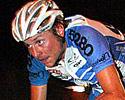
|
At the same time, however, it is still a very human and very emotional sport and the bottom line is that the athletes have to be happy and their morale has to be good. You have got to teach them to deal with a new culture, to live out of a suitcase and to move from hotel to hotel. That is a very, very difficult existence.
At times during my work with TIAA-CREF I find that the experience is more valuable than the advice you give the athletes. You just have to help guide their experiences more than anything else.
CN: Are there any guys who stand out on the team as stars for the future?
AL: Yes, absolutely. Mike Friedman is definitely one of those guys. He is incredibly strong; he is just a beast. I think all we have to do with that guy is just let him continue to develop and teach him a bit about strategy. He went on a couple of long breaks in the FBD Insurance Rás - they really showed his strength, but he probably didn't need to do it in that way, being [on the] front for so long. But he is just a real strong kid.
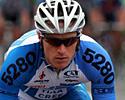
|
Danny Pate is another. He is an exceptional talent and, not only that, is also a great person and an exceptional leader. The younger riders just adore him, they look up to him. He is great at giving advice and counsel. He is just a great asset for our program.
Brad Hoff won a stage at the Tour of Normandy earlier this year. Man, that guy can motor. He is a great track rider, as is Friedman. And we have a young rider, Tom Peterson, who is an exceptional climber. He is only 19 years old right now but he is perhaps the best climber on our squad. There will be great things coming from him. He just needs to learn how to become a better bike handler and bike racer in general, but the engine is there.
Then there is Lucas Euser. If it is straight up, this kid can climb with the best in the world. He was in the mountains jersey for a while at the Tour of Georgia. As regards the others, there is a whole cast of young guys who are really, really excited and really motivated to be the next generation of great American riders.
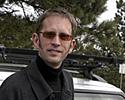
|
CN: Does the team have ProTour aspirations for the future?
AL: Yes, we definitely have that goal. Johnathan is talking openly about having ProTour aspirations; we want to be another ProTour team based out of the United States. Of course, I think the ProTour won't have a vacancy until 2009 so we are just going to have to continue and keep developing our riders in that time, and wait and see.
I would say it depends on having good luck in finding the right sponsor. Also, I hope that most of our riders will keep going, continuing to progress. That is ultimately the hope; with the age and the level our riders are at right now, the hope is that if we do get that ProTour slot, they will be ready for the challenge and ready to fill in the gap for the next generation of American cyclists.
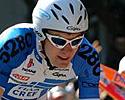
|
You never know who that is going to be. There is so much involved in that. We often say that it is not that cycling is hard, it is that life is hard…these kids are at a young age in their lives and have a lot of opportunities there for them, not only in cycling. I think that our goal is not necessarily to ensure that they become great professionals, but to ensure that they have a good, positive experience out of it. If it is within their abilities and their natural talent and mindset to become good professionals, then great. If it is not, then they are young enough that they will have opportunities elsewhere in their lives.
That is an essential philosophy that Jonathan puts out there for the team. There is no guarantee that you are going to make it as a pro cyclist; it is a hard, hard job. But whether you make it or not, you shouldn't have any regrets about it. This team was basically created so that at the end of the day, the riders can say, "yes, we threw everything at it and gave it every opportunity."
CN: The team is regarded as having a clean stance, as regards doping. So I guess that philosophy of doing your best, rather than winning at all costs is a relevant one…
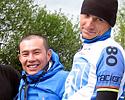
|
AL: Absolutely. After all, in the big picture, what is cycling? It is just a bunch of guys in lycra, riding our bikes around. I think sometimes we all struggle with the social relevance of it all. In the big picture, if you can succeed at the top level in this sport, you have the capacity to inspire a lot of people and do a lot of good. But if you are not quite there, if you don't end up at that level, then there are still other options. Perhaps you'd be better off becoming an accountant or an architect, or opening up a really great restaurant and making people happy that way. The message that we try to give the riders is that there will be some way that you can contribute. How you do that, whether it will be through cycling or not, who knows?
But that is what is important here. It is not about winning at every cost. We want to win because we are motivated, because we work hard, not because we live and breathe based on our results.
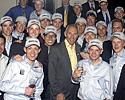
|
CN: It is a different way of looking at things than many teams…
AL: Yes, but I think that type of culture or mentality is one that needs to be promoted across the sport, and across sponsorships. Sponsors need to be telling that type of story, because that is the story which inspires other people to achieve better things. It is the type of story which I think suits companies if they want to associate their names with something.
Right now I think we are stuck in a culture where it is all about the winner, but the fact of the matter is just because you win a bike race it doesn't make you a better person. And just because you lose a bike race that doesn't make you a bad person, either. There are hundreds of stories in the peloton, hundreds of stories of hard work and of people who have overcome a lot of adversity.
